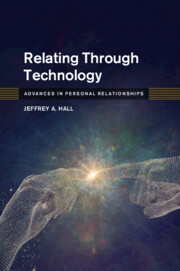Book contents
- Relating Through Technology
- Advances in Personal Relationships
- Relating Through Technology
- Copyright page
- Dedication
- Contents
- Figures
- Tables
- Introduction
- 1 Social Ecology and Personal Media
- 2 The Social Construction of Technology
- 3 Theoretical Perspectives on Personal Media and Relationships
- 4 Niche, Media Displacement, and Multimodal Relationships
- 5 Mode Comparison and Coexistence
- 6 Three Ways of Seeing Social Media
- 7 Five Enduring Tensions in Personal Media
- 8 Digital Stress
- 9 Social Displacement
- 10 Connectivity and Connection
- References
- Index
6 - Three Ways of Seeing Social Media
Published online by Cambridge University Press: 26 June 2020
- Relating Through Technology
- Advances in Personal Relationships
- Relating Through Technology
- Copyright page
- Dedication
- Contents
- Figures
- Tables
- Introduction
- 1 Social Ecology and Personal Media
- 2 The Social Construction of Technology
- 3 Theoretical Perspectives on Personal Media and Relationships
- 4 Niche, Media Displacement, and Multimodal Relationships
- 5 Mode Comparison and Coexistence
- 6 Three Ways of Seeing Social Media
- 7 Five Enduring Tensions in Personal Media
- 8 Digital Stress
- 9 Social Displacement
- 10 Connectivity and Connection
- References
- Index
Summary
This chapter is about social networking sites and social media. Bracketing direct and private communication through other modalities (e.g., email, IM, chat/text), the remaining types of communication made possible through social media are examined. This chapter reviews mass-personal communication perspective on social media. This chapter offers three themes to understand social media use: social media as the social news, social media as the archive of self, and social media as bridging social capital. Social news is the idea that we use social media to advertise the events of our lives and read about the lives of others. The archive of self refers to both the searchability and permanence of our digital connections made possible with social media. Theories of social capital were among the first perspectives to develop during the rise of social media, and the value of social media for bridging social capital is examined in this chapter.
Keywords
- Type
- Chapter
- Information
- Relating Through TechnologyEveryday Social Interaction, pp. 112 - 134Publisher: Cambridge University PressPrint publication year: 2020

